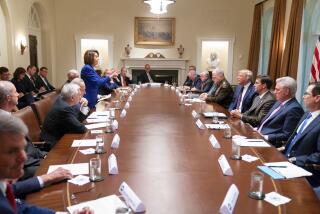Fear, Search for Justice Guided Tripp
- Share via
WASHINGTON — In her most substantive interview since the sex-and-lies investigation of President Clinton began, Linda Tripp on Friday said she once worried that she might be killed and that Monica S. Lewinsky might commit suicide in a world in which she believed the White House had intrigued, schemed and plotted against them.
While providing no specific details, Tripp accused Lewinsky of having passed along threats “to my life . . . to the lives of my children” that she presumed came from Clinton. At the same time, she characterized Lewinsky as so hysterical that the former White House intern would not be alive today if Tripp had not secretly recorded her friend’s confidences and exposed the presidential affair.
Jim Kennedy, spokesman for the White House counsel’s office, said that Tripp’s statement was “such a bizarre accusation that it’s ludicrous.”
Tripp also said Lewinsky is still lying to protect the president.
Lewinsky spokeswoman Judy Smith said her client’s immunity agreement with independent counsel Kenneth W. Starr prohibits her from talking about the case without Starr’s approval. But, Smith said, Tripp’s versions of events “are at the top of the list of things that Monica’s going to straighten out” when she can comment.
The Tripp interview, on NBC’s “Today” show, was one of several media appearances the former White House aide is making in an attempt to restore her reputation. She is denying political and financial motivations, and is portraying herself as a former Army wife who believed that she was called upon to seek justice. She spoke to the New York Times this week and plans to appear Monday on Cable News Network’s “Larry King Live” program.
Tripp’s statements added flavor to earlier disclosures in her testimony before Starr’s grand jury and in taped telephone conversations between her and New York literary agent Lucianne Goldberg--all revealing intense fears of imminent physical harm that jurors, and sometimes even her friends, appeared to discount.
In one transcript of a September 1997 talk with Goldberg, Tripp worried aloud about an unexpected invitation to spend the weekend at the Connecticut estate of Norma Asnes, a wealthy acquaintance who also was a friend of First Lady Hillary Rodham Clinton. The offer came soon after the president realized that Tripp would be subpoenaed in the Paula Corbin Jones sexual harassment case.
“You don’t think they’re going to poison me, do you?” she asked Goldberg, who replied: “Uh, no. They’re going to try to co-opt you.”
Tripp said she is well aware that public opinion has cast her as the villain who betrayed a friend in the melodrama leading to Clinton’s impeachment and Senate trial.
Appearing slimmed-down and composed for her “Today” appearance, Tripp insisted that, given a chance to make choices again, she would repeat her actions because she was trying to save Lewinsky and fulfill “my patriotic duty.”
When Tripp was asked if she owed Lewinsky an apology, her answer was a quick “No.”
The president, Tripp said, “emotionally abused Monica and discarded her.” After a year of keeping Lewinsky’s secrets, she said, she became appalled to the point that “there was absolutely no doubt in my mind I wanted this behavior exposed.”
And she was scared. “Monica made those threats and passed them along to me, I believed, from the president. I believed I was in jeopardy.”
The source close to Tripp would not amplify beyond saying: “The threats were many and varied, and she took them seriously.”
Tripp said that she sounds manipulative on the tapes with Lewinsky because “I re-created conversations that we had had over the last year” that she wanted on the record.
In the end, she said, her documentation saved Lewinsky’s life.
“Embarrassing, yes. She’s alive today. She has a future today. I would not have given you odds on that in December,” Tripp said.
Lewinsky was being labeled as a “stalker” and was “expendable,” Tripp said.
But in fact, Tripp said, Lewinsky was “a young girl in love with Elvis.”
“She has a great big heart,” Tripp said. “She’s protecting the man she loves.”
Lewinsky continues to offer misleading testimony, she said, alleging that Clinton told his paramour to “deny, deny, deny” the affair, even when it came to testimony under oath in the Jones case.
Tripp acknowledged that she “may have mentioned to one or two of the agents” on the afternoon that she lured Lewinsky to an interview with prosecutors that “I needed to get home because I had an interview with the Paula Jones attorneys.” Clinton was being deposed the next day by lawyers for Jones in the complaint she had filed against him, and Tripp offered the attorneys advice for the questioning.
Later, Tripp’s attorney, Anthony Zaccagnini, backed off that admission, telling the Associated Press that Tripp did not specify that her appointment was with Jones’ attorneys.
Starr testified to Congress that he did not know Tripp was meeting with the Jones attorneys. The issue is important because it was during Clinton’s Jan. 17, 1998, deposition that he gave the responses that became the heart of the impeachment case that has consumed Capitol Hill. Critics have charged that the timing set a perjury trap for Clinton.
Starr conceded in an earlier interview with ABC’s Diane Sawyer that he “should have had better control” over Tripp in the early phases of his investigation. The Los Angeles Times previously reported that Starr had not set up the usual barriers that keep witnesses from discussing cases under investigation, allowing Tripp to brief Jones’ attorneys.
More to Read
Sign up for Essential California
The most important California stories and recommendations in your inbox every morning.
You may occasionally receive promotional content from the Los Angeles Times.










